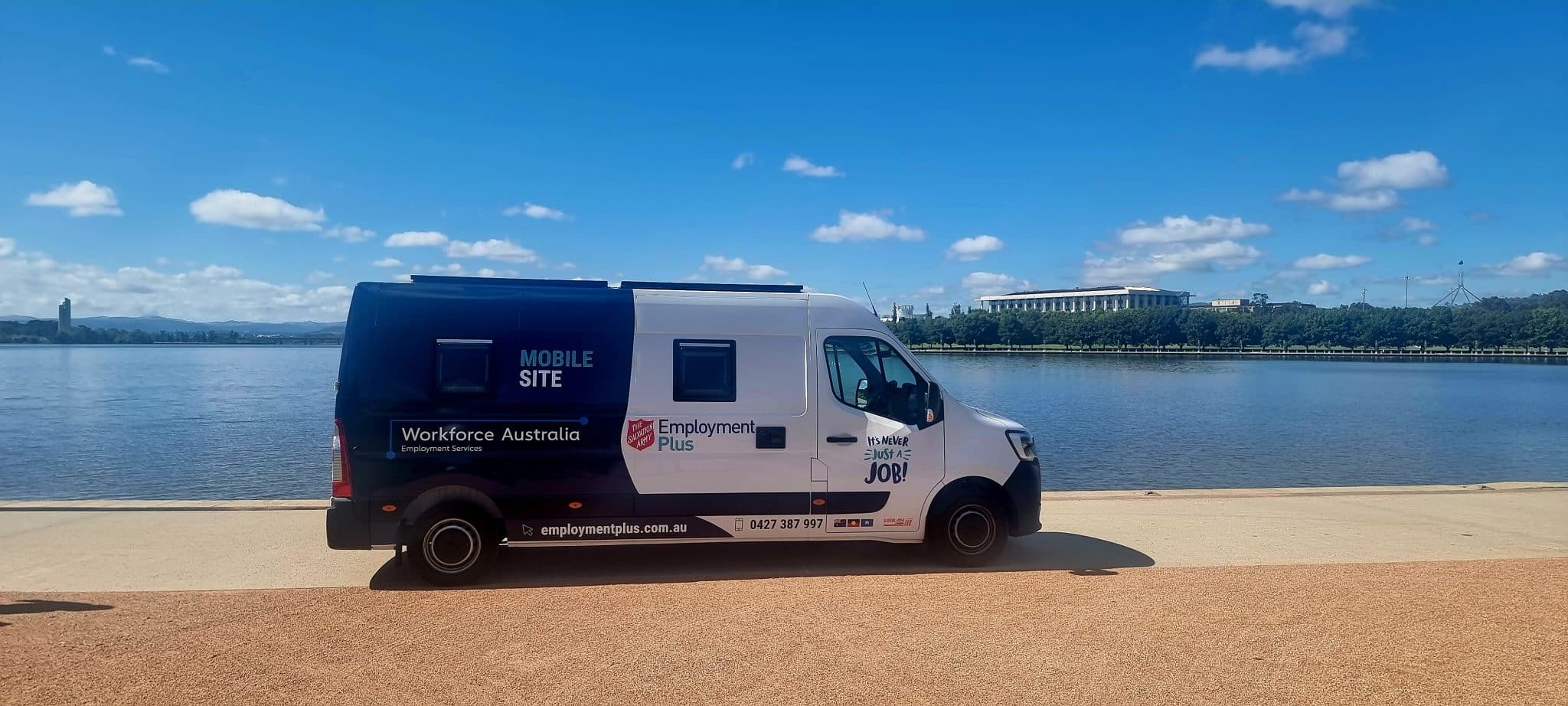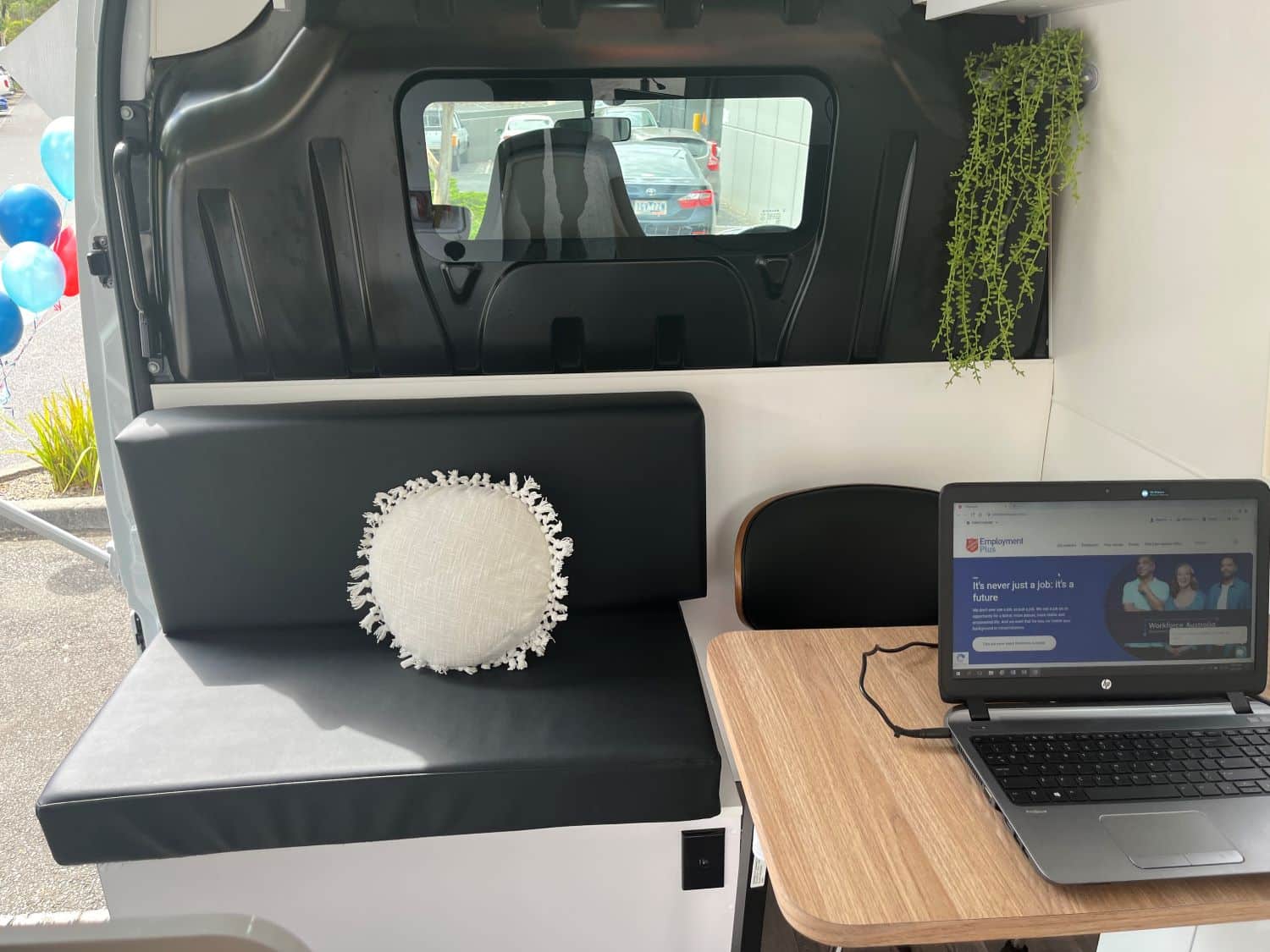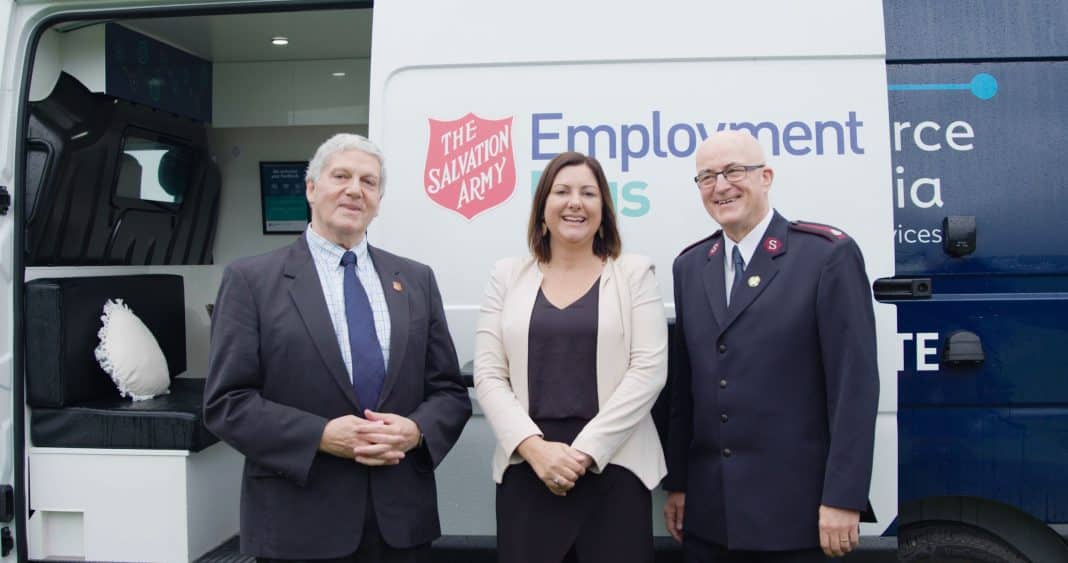Regional job seekers are being given a helping hand with The Salvation Army’s new Employment Plus Bus. After a test program in Western Australia, the service has been adapted and put to the work in Canberra with the official launch at Parliament House this week, Wednesday 29 March.
Minister for Rural Development Kirsty McBain helped cut the ribbon on the brand-new vehicle, saying the difference it will make to regional communities is nothing short of extraordinary. Sometimes, she says, cities take for granted things that regional communities don’t have access to.
“Public transport is not a thing for so many of our towns and villages. Even across Eden-Monaro, access to good connectivity, the ability to have a driver’s licence and access a car can be difficult,” Ms McBain says.
The work of the bus aligns with the values of the Albanese Labor Government, she says, ensuring people can access services that are convenient to them when job seeking. Without a service like this, people might not even ask for assistance when they needed it, and she applauds the continued hard work of the Salvation Army.
“I have seen this firsthand during multiple natural disasters, where we have had the Salvation Army pick up the pieces for communities, for local organisations, and for individuals who have been directly impacted.
“They continue to do this. This mobile bus service again shows us that they are not only there for jobseekers when they are ready to take that step.”
With towns like Bibbenluke, Bombala, Harden and Goulburn on the map, people in the smaller regions will be able to get the same service as those living in larger cities.
Though the bus first hit the road in February, it has already significantly impacted the lives of people in regional areas around Canberra.
“The fact that the last six, seven weeks we’ve been able to help well over 500 people and that’s a figure I didn’t believe when I first heard it, I had to check – it is quite amazing,” says Dr Graeme White, national director.
Since its official beginnings in 1998, the Salvation Army Employment Plus division has helped more than 600,000 Australians gain employment. Today, over 32,000 people are engaging with programs across the country. Dr White knows the work they do is invaluable to many, especially those who have been unemployed a long time.
“They come into us, their confidence is low, their skill sets are stale and we’re in a position to be able to help them move forwards in the right direction,” he says.
A few years ago, they started taking note of the trend that people in regional areas cancelled appointments at a higher rate than city clients, citing lack of transport, either access to a car or public options. In 2019, the trial bus program began in regional WA communities, and throughout the 18 month pilot, they saw positive steps towards higher employment rates.
“In traveling to these little towns, we found we could build a relationship with local employers and community service providers. So, all of a sudden, jobs that weren’t apparent before were starting to surface and this made it easier for people to find work,” Dr White says.
During the pandemic and lockdowns, they noticed that fewer people were progressing with their employment journey when consultations were done over the phone or online.
“The face-to-face really gives us an opportunity to build a trusting relationship with them; it has them open up, really tell us about their aspirations for a career or job, and we get to the bottom of what their real barriers are,” he says.

A van was chosen for the program because it could be driven on a regular licence, comfortably and confidently by their consultants.
On board, there are two workstations with another outside. It is equipped with laptops, privacy screens and a satellite phone. The first aid kit includes a defibrillator, while solar panels on the roof and back-up batteries ensure air conditioning can run when the van is off.
There is also a fridge, freezer, microwave and niceties like coffee, tea and biscuits – even resources to make clients lunch.
“We found in some other regions with remote people is that sometimes people come to appointments without having eaten that day,” Dr White says.
Hosting eight daily sessions via appointment before arrival, the bus can cater to 24 people each day, with most sessions running for 30 minutes. They will also be able to provide group training with the help of the overflow space where they will go through practice interviews, resume building, and setting expectations with pre-employment training.
“They’re not shocked they’re getting out of bed at the right time, they know they’re not going to have friends on day one, what to expect in the workplace with lunch, and that sort of stuff,” Dr White says.

If transport is the main issue holding clients back from appointments and therefore getting a job, the government can provide assistance. Dr White says they can help with funding a vehicle through the employment fund, but people will often find a way when offered a job.
“Often where there’s a will there’s a way, if they get a job, they find a way to get there. They get a drop off or someone else who’s an employee there can give them a lift. The key is getting in the door,” he says.
The bus doesn’t just open employment doors.
Major Peter McGuigan, head of government relations for the Salvation Army, says the organisation is approaching it as a bridge to help people in regional communities access the other services they provide.
A number of job seekers also face non-vocational barries, issues or disadvantages that are holding them back from obtaining employment, such as domestic violence, homelessness or addiction issues. For these individuals, the National Doorways program is there, Major McGuigan says.
“People who are struggling to make ends meet, even with the simple provision of food and things like that is vital for some of these people. They’re seeking employment but they have these other issues as well,” he says.
To find out more about the work of The Salvation Army, visit salvationarmy.org.au
Get all the latest Canberra news, sport, entertainment, lifestyle, competitions and more delivered straight to your inbox with the Canberra Daily Daily Newsletter. Sign up here.


